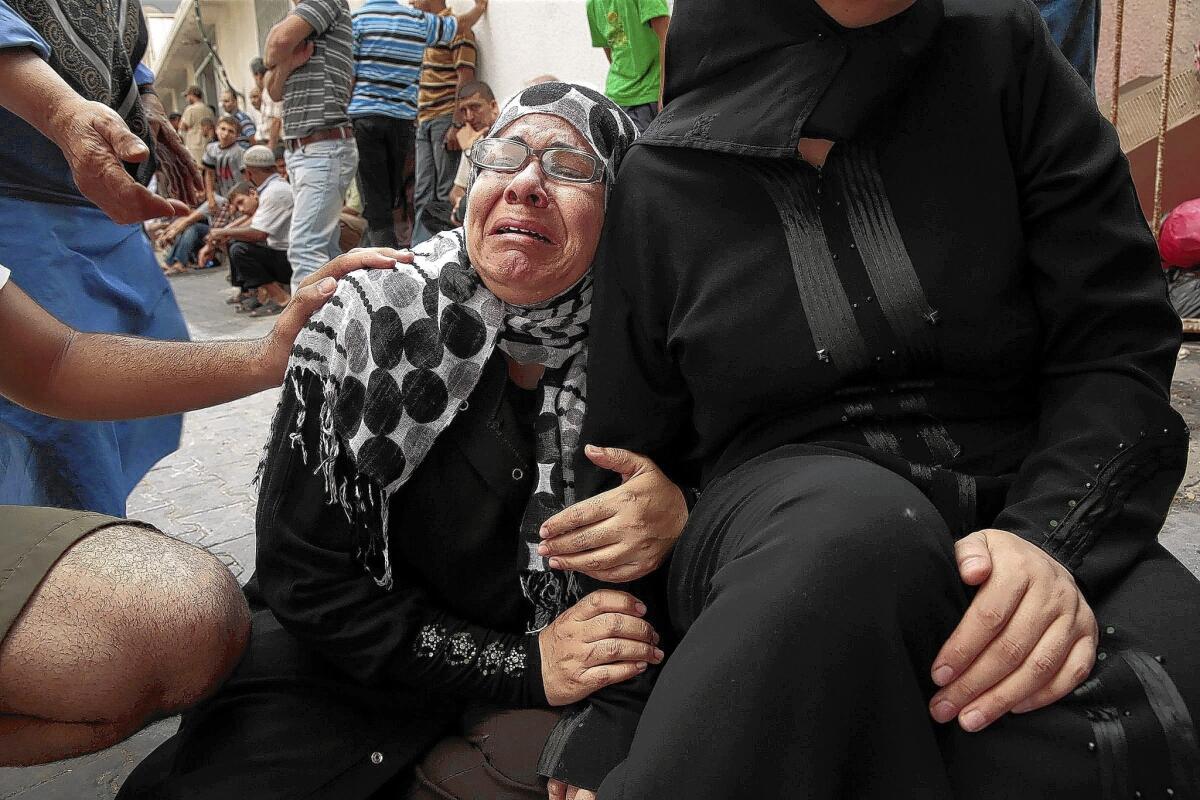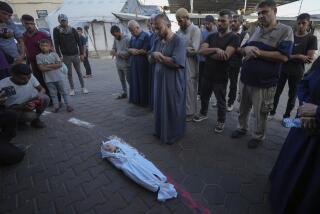Israel pounds Gaza neighborhood it says is rocket-launching site

- Share via
Reporting from GAZA CITY — Israeli troops pounded an eastern neighborhood of Gaza City with air and artillery strikes Sunday, trading fire with Hamas militants armed with antitank missiles and rocket-propelled grenades and sending a tide of panicked humanity streaming from the area.
Most of those fleeing left empty-handed, carrying only their children in their arms as gunfire and explosions reverberated around them.
The fighting, described as the heaviest of Israel’s 13-day campaign in the Gaza Strip, killed at least 66 Palestinians, injured hundreds more and displaced tens of thousands, according to Palestinian health officials. Thirteen Israeli soldiers died, the Israeli military said.
More than 430 Palestinians have been reported killed overall, most of them civilians, according to the United Nations.
U.N. Secretary-General Ban Ki-moon called Israel’s actions in the Shajaiya neighborhood “atrocious” and said it must do far more to protect civilians.
“Too many innocent people are dying,” Ban said in Doha, Qatar, the first stop of a regional trip to try to bring an end to the fighting.
In an unguarded moment caught on an open microphone before an interview with Fox News, Secretary of State John F. Kerry appeared to express frustration Sunday with the Israeli campaign’s mounting toll. “It’s a hell of a pinpoint operation,” he was heard telling an aide.
Asked about the comment in the interview, Kerry said he reacted “in a way that anybody does with respect to young children and civilians.” But he defended Israel’s right to go after a network of tunnels used by Hamas and its allies to strike at Israel.
He noted that Israel accepted an Egyptian cease-fire proposal that was rejected by Hamas, which controls Gaza. The Islamic militants say they will continue fighting until Israel and Egypt agree to lift a crippling blockade on the coastal enclave. Kerry was expected in Cairo on Monday to lend his support to the stalled talks.
Palestinian leaders accused Israel of war crimes. “What the brutal occupation forces have done today in Shajaiya in the Gaza Strip is a crime against humanity and a heinous massacre,” Palestinian Authority President Mahmoud Abbas said in a televised address Sunday night. “We demand immediate international protection for our Palestinian people.”
Israeli Prime Minister Benjamin Netanyahu said in a tweet that “Israel regrets any inadvertent strike on Palestinian civilians.” But he defended the operation in a national address as vital to Israel’s security.
Speaking earlier to ABC News, Netanyahu said the goal was to restore “a sustainable quiet.” The next stage, he said, would be working with the international community to “demilitarize Gaza.” He did not elaborate.
Israel took some of its worst military losses in years, with the Israel Defense Forces announcing that 13 soldiers were killed while fighting Hamas militants since the previous night. The losses brought the number of Israeli military dead in the Gaza campaign to 18. Two civilians have also been killed by projectiles fired from Gaza.
Israel’s military did not describe how its soldiers died, but Hamas said its militants had struck an armored personnel carrier. According to Israeli media, seven were killed as the vehicle was hit with an antitank missile, and the rest died in the close-quarters combat that followed.
About 60 soldiers injured Sunday morning were airlifted to several hospitals around Israel.
There were unconfirmed reports of two Americans being among the Israeli dead, including a 24-year-old from Woodland Hills.
Late Sunday, the military wing of Hamas, the Izzidin al-Qassam Brigade, claimed to have captured an Israeli soldier, setting off celebrations in the Palestinian territories. Israel did not immediately confirm that one of its soldiers was missing, and Hamas has made similar claims in the past that were not true.
Hamas-allied militants who captured Israeli soldier Gilad Shalit in 2006 held him captive until 2011, when Israel agreed to free more than 1,000 Palestinian prisoners in exchange for his release.
The White House said President Obama had spoken to Netanyahu for the second time in three days to discuss the Gaza invasion. Obama “reiterated the United States’ condemnation of attacks by Hamas against Israel and reaffirmed Israel’s right to defend itself,” a White House statement said. “The president also raised serious concern about the growing number of casualties, including increasing Palestinian civilian deaths in Gaza and the loss of Israeli soldiers.”
Lt. Col. Peter Lerner, an Israeli military spokesman, said Shajaiya was targeted because it is a stronghold of Hamas and the source of 8% of the rockets fired at Israel. Netanyahu said more than 2,000 had been fired since July 8.
Most of these rockets are stored underground in a network of tunnels running beneath houses and schools, Lerner said. “Everything is underground including maintenance, loading — it is all beneath the surface. They open a hatch, they fire, close the hatch, and that’s it.”
He said residents had been warned for three days to leave the area before Israeli ground troops backed by tanks moved in overnight to destroy the tunnels.
The troops met a “huge” amount of resistance in Shajaiya from fighters armed with antitank missiles, rocket-propelled grenades and automatic weapons fired from houses and other buildings, Lerner said.
Some of the Palestinian civilians fleeing Sunday acknowledged receiving recorded messages on their phones warning them to leave, but said they did not expect the shelling to be so bad, or had no place else to go in the densely populated enclave, which is less than 30 miles long.
“They called us early yesterday, at 4 a.m.... But we were already hearing explosions in the area,” said Najah Obed, matriarch of an extended family of 60. “We thought it would be safer to stay.”
She bristled at Israeli suggestions that Hamas told residents to ignore their warnings. “That’s wrong. Hamas does not use civilians as human shields,” she said. “We did not leave our house because we have no place to go.”
Family members held on as long as they could, she said. But when the first tank shells started hitting nearby houses, they fled, joining columns of people piling into vehicles and making their way on foot toward the city center. Rows of houses were damaged or destroyed.
“There was blood and body parts and kids’ toys in the street,” she said, beginning to cry. “We never witnessed anything as bloody as this.”
The first casualties were brought to Shifa hospital in Gaza City before dawn. Within hours, ambulances were arriving every few minutes, full of bleeding, screaming passengers. Many did not survive long, medical staff said.
In the hospital morgue, white body bags lined the floor. Relatives crowded around, weeping and crying out to God. A small bundle wrapped in a soiled sheet lay on a table. Tawfiq Salim pulled away a fold and gently stroked the blood-spattered cheek of his 7-year-old niece. More blood pooled under the table.
“We were bombed as we tried to get here,” he explained. “Everything that moved in the street was being shot.”
An ambulance picked up Salim’s family and ferried them out. But his brother’s family had to flee on foot, he said. The ambulance was headed back to get them when a tank shell slammed into the street, killing his niece and her two brothers, 5 and 13.
At least one paramedic was killed in an Israeli strike Friday. His body was brought to the hospital in the morning, closely followed by that of a local freelance journalist.
Ambulances pulled out of the area until Israel agreed to a Red Cross request for a two-hour pause in the afternoon to allow emergency workers to collect the dead and wounded, and civilians to leave. Israel accused Hamas of breaking the temporary cease-fire, but then agreed to extend it by two more hours.
Outside the Shifa hospital morgue, entire families gathered under trees on the lawns, uncertain where to go.
Ahmed Fayoumi said his family spent a sleepless night listening to the shelling. Shortly before dawn, as many in the neighborhood were eating their last meals before beginning their daytime fast for the Muslim holy month of Ramadan, a barrage of tank fire started hitting the homes in his area.
“The house was shaking and there was smoke everywhere,” he said. “We barely had time to leave with our clothes on.”
It took them more than an hour to reach the hospital on foot, he said. Along the way, they passed several United Nations-run schools crammed with displaced people, but there was no room to take in any more, he said.
More than 60,000 people are already staying at U.N. shelters, according to the United Nations refugee agency for Palestinians. Fayoumi’s family planned to spend the night under a tree on the hospital grounds.
“This is the safest place,” he said. “So far, it hasn’t been hit.”
At 3 p.m., Riyad Abul Kass and his wife, Aida Khalil, were still wandering the streets, looking for a place to spend the night. He carried two small plastic bags, and she had several rolled up sleeping mats balanced on her head.
Their house was flattened, they said. “There is nothing there but ashes,” Khalil lamented. “Where can we go? … We are 15 people.”
A stranger took pity on them and invited them into her home until they found a place.
Times staff writer Zavis reported from Gaza City and special correspondent Sobelman from Jerusalem. Staff photographer Carolyn Cole in Gaza City, staff writer Lauren Raab in Los Angeles and special correspondents Maher Abukhater in Ramallah, West Bank, and Amro Hassan in Cairo contributed to this report.
More to Read
Sign up for Essential California
The most important California stories and recommendations in your inbox every morning.
You may occasionally receive promotional content from the Los Angeles Times.











